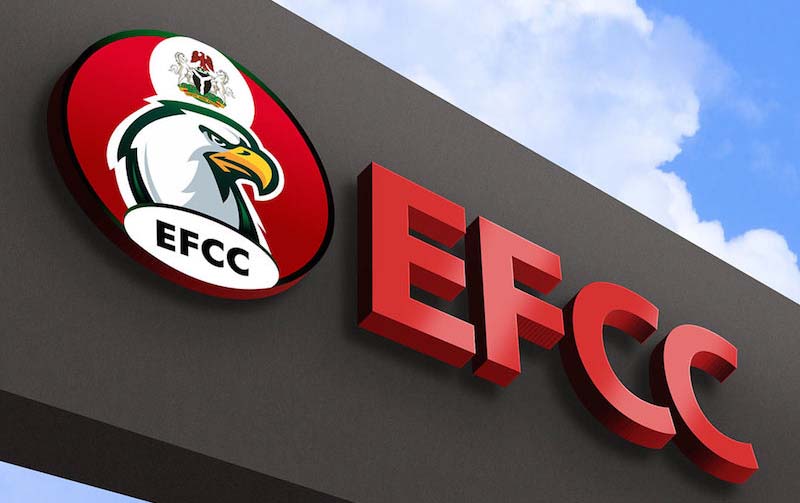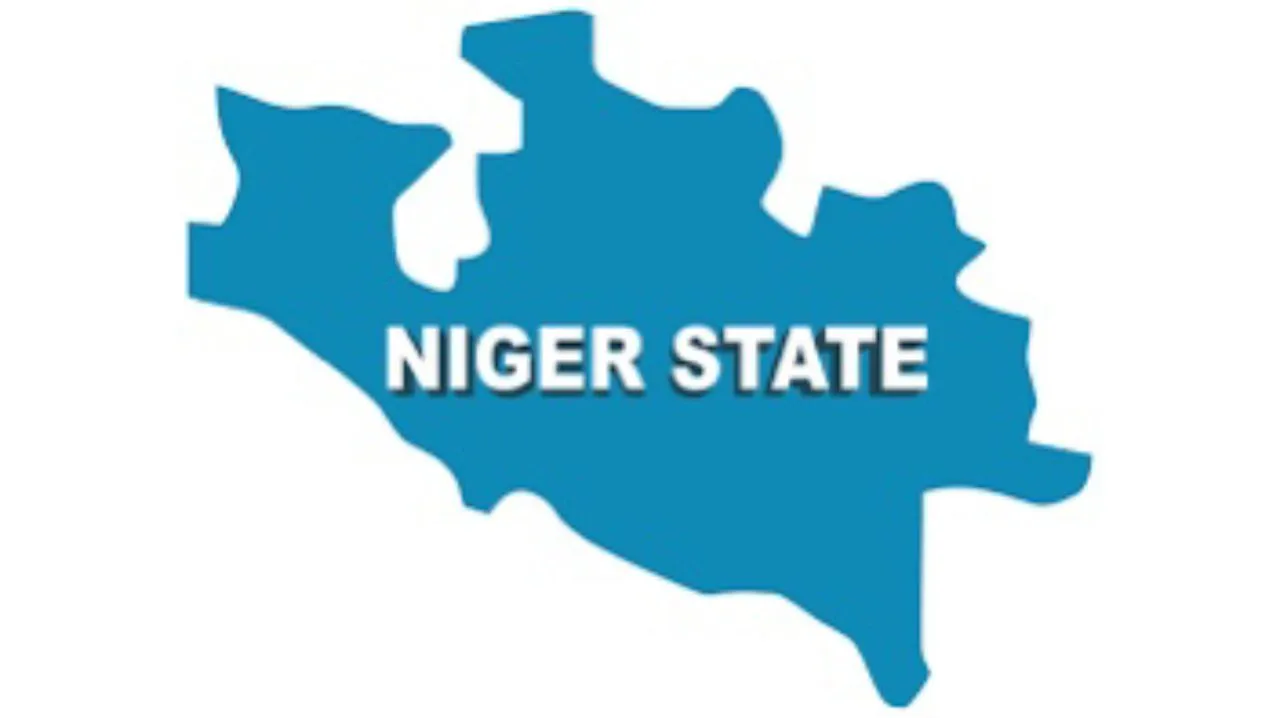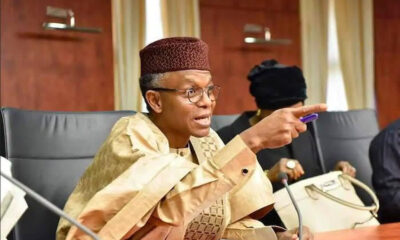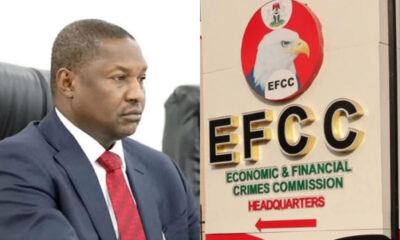metro
EFCC recovers N70bn in 100 days …receives 3,325 petitions

EFCC recovers N70bn in 100 days …receives 3,325 petitions
The Economic and Financial Crimes Commission has recovered a total of N70,556,658,370.5 within 100 days, between October 2023 and January 19, 2024.
Details of the recovery outlined in an EFCC document titled, ‘Operations and Recoveries’, was obtained on Wednesday.
The document revealed that between October 2023 and January 19, 2024, the EFCC recovered N60,969,047,634.25, $10,522,778.57, £150,002.10, €4,119.90, making a total of N70,556,658,370.5 recovered by the anti-graft commission within the period.
Within the same period, the EFCC received a total of 3,325 petitions, accepted 2,657 of the petitions, and secured the convictions of 747 persons for financial crime offences ranging from money laundering to internet fraud.
The Maiduguri Zonal Command recovered N58,065,870 and $3,370. Gombe Command recovered N127,323,028.50 and $1,500. Kano Command recovered N141,944,451 and $365.
Makurdi Command recovered N53,228, 325. Enugu Command recovered N202,117,000 and $1,950. Uyo Command recovered N25,299,950 and $710, while Port Harcourt Zonal Command recovered N2,412,247,210.05 and $5,714,389.21.
READ ALSO:
- Defence Chief sends special fact finding team to Jos over Plateau crisis
- Terrorism/Kidnapping: Influential Northern Senator under watch
- Tinubu, Nigeria is sinking and streets are full of tears – Farooq Kperogi
Sokoto Command recovered the sum of N100,696,118.72, while Kaduna Command recovered N331,494,710.81, $912, £50, and €1,610.
The document also indicated that the Ilorin Command recovered N80,280,580.86 and $880, while the Abuja Zonal Command recovered N825,928,463 and $10,000.
The Ibadan Zonal Command recovered N135,519,810, $14517, £280, and €500, while the Lagos Zonal Command recovered N6,826,993,798.78, $868,284.61, £147,672.10, and €1899.90.
The EFCC, through its Benin Zonal Command, also recovered N49,515,987.09 and $5,700.
Meanwhile, within the same period, the EFCC secured the conviction of 747 for offences ranging from money laundering to cybercrimes.
However, the Chairman of the EFCC, Ola Okukoyede, at a dialogue in Abuja, revealed that most of the 747 convictions secured by the commission, involved persons who were prosecuted for cybercrime offences.
Olukoyede made this known during an EFCC event themed, ‘Dialogue on Youth, Religion, and the Fight against Corruption’, which was held at the Musa Yar’Adua Centre, Federal Capital Territory.
The EFCC boss also launched its Fraud Risk Assessment Project for Ministries, Departments, and Agencies during the event.
EFCC recovers N70bn in 100 days …receives 3,325 petitions
metro
Police Arrest 13 as Armed Robbers Engage Officers in Fierce Gun Battle in Abuja

Police Arrest 13 as Armed Robbers Engage Officers in Fierce Gun Battle in Abuja
Operatives of the Nigeria Police Force have arrested 13 suspected members of a criminal syndicate responsible for a wave of violent armed robberies across Federal Capital Territory, following intense gun battles in multiple locations within the nation’s capital.
The suspects were linked to coordinated robberies in Gwagwalada, Apo, Waru, Jahi, Wuse, and other parts of Abuja, with investigations revealing that the same gang had earlier carried out attacks in Asokoro, Mabuchi, and Utako, targeting hotels, residential apartments, and unsuspecting residents.
Confirming the development, the FCT Commissioner of Police, Miller G. Dantawaye, said the arrests followed credible intelligence that led operatives to a criminal hideout in Durumi, an Abuja suburb notorious for criminal activity.
According to the police chief, operatives stormed the hideout after sustained surveillance but were met with heavy gunfire from the suspects. The police team responded decisively, overpowering the gang and arresting eight suspects during the initial exchange.
READ ALSO:
- Bandits Kill Six, Burn Police Station in Fresh Niger Attacks
- US Freezes Assets of Eight Nigerians Over Boko Haram, ISIL, Cybercrime Links
- Terror in Lagos Traffic: Cutlass Gang Unleashes Mayhem on Mile 12–Ketu Road
The operation was led by ACP Victor O. Godfrey, commander of the Scorpion Squad, a tactical unit of the FCT Police Command tasked with handling high-risk crime and armed robbery cases.
The command explained that the Scorpion Squad had earlier conducted intelligence-led operations in Apo-Waru and Durumi following multiple complaints from victims of violent robberies in Asokoro, Mabuchi, and Utako.
Further follow-up operations led operatives to a second hideout in Apo-Waru, where another gun duel occurred. Five additional suspects were arrested at the location, bringing the total number of suspects in custody to 13.
Police said the suspects were positively identified using CCTV footage obtained from one of their recent robbery operations, providing critical evidence linking them to multiple crimes across the FCT.
Preliminary investigations revealed that the syndicate was behind several high-profile robberies, including an attack on a hotel in Gwagwalada, where victims were dispossessed of cash, foreign currency, and mobile phones, while a vigilante operative was disarmed.
Another incident linked to the gang was a robbery at a Travel Lodge in Wuse Zone 6, during which a police officer sustained serious injuries, and a vehicle was stolen. The suspects were also implicated in a robbery at a residential apartment in Jahi, affecting residents, including security aides attached to the Executive Governor of Kebbi State.
The 13 suspects were identified as Yahaya Hassan, Umar Shuaibu, Adamu Ibrahim, Abubakar Sani, Abdullazeez Usain, Aliyu Aminu, Aliyu Adam, Ibrahim Usman, Suleiman Yawata, Mohammed Ali, Sani Hamza, and Hassan Abba.
Items recovered from the suspects include a grey Toyota Corolla (2015 model) with registration number ABC 200 GP, one AK-47 rifle, one locally fabricated rifle, one Jericho 941 pistol, 7.62×39mm ammunition, seven rounds of 9mm live ammunition, assorted iPhones, $100 in one-dollar denominations, and assorted charms.
CP Dantawaye said investigations are ongoing to identify other members of the syndicate and trace the source of the weapons. He added that the suspects would be charged to court upon the conclusion of investigations.
The police commissioner reaffirmed the command’s commitment to protecting lives and property in Abuja and urged residents to remain vigilant and report suspicious activities through the command’s emergency lines: 08032003913 and 08061581938.
Police Arrest 13 as Armed Robbers Engage Officers in Fierce Gun Battle in Abuja
metro
Bandits Kill Six, Burn Police Station in Fresh Niger Attacks

Bandits Kill Six, Burn Police Station in Fresh Niger Attacks
At least six people have been killed and a police station razed following coordinated attacks by suspected bandits on rural communities in Niger State, intensifying fears over growing insecurity in the area.
The attacks began late on Friday night and continued into the early hours of Saturday, targeting Tungan-Makeri and Konkoso communities in Borgu Local Government Area. Residents said the attackers arrived in large numbers, shooting indiscriminately, setting houses on fire, and forcing villagers to flee in panic to neighbouring settlements and surrounding bushes.
An eyewitness from Zagatina village, located along the route reportedly used by the attackers, described the operation as highly coordinated, with dozens of motorcycles transporting the gunmen.
“I counted about 41 motorcycles, each carrying two or three people. Some even had women and children with them. When I realised they were approaching, I hid in the bush as they passed behind my house,” the resident said.
By the time the attackers withdrew from Tungan-Makeri, six residents had reportedly lost their lives, several homes were destroyed, and many families displaced. Some villagers were also declared missing, raising fears of possible abductions during the raid.
The assailants were said to have moved on to Konkoso in the early hours of Saturday, where they allegedly set a police station on fire, destroying official property and escalating tension in the area. Residents described the attack as brazen and prolonged, noting the absence of visible security personnel throughout the hours-long operation.
READ ALSO:
- US Freezes Assets of Eight Nigerians Over Boko Haram, ISIL, Cybercrime Links
- Terror in Lagos Traffic: Cutlass Gang Unleashes Mayhem on Mile 12–Ketu Road
- FG Drags El-Rufai to Court Over Alleged NSA Phone Interception
Some villagers later reported sighting an aircraft belonging to the Nigerian Air Force hovering over Tungan-Makeri after the initial assault, suggesting that aerial surveillance may have contributed to the eventual withdrawal of the attackers.
Confirming the incident, the Police Public Relations Officer of the Niger State Police Command, Wasiu Abiodun, said the command received reports that suspected bandits invaded Tungan-Makeri at about 3:00 a.m., entering through the Shafachi axis of Borgu LGA.
He confirmed that six persons were killed, several houses were burnt, and an unspecified number of residents were abducted, adding that the attackers later advanced toward Konkoso before fleeing.
According to him, joint security teams have since been deployed to the affected communities to assess the level of damage, pursue the attackers, and rescue abducted victims.
The latest violence highlights persistent security challenges in Borgu LGA, where armed groups are believed to exploit vast forest routes and porous borders. Residents and community leaders have renewed calls on authorities to strengthen security presence, establish permanent security bases, and improve surveillance in vulnerable communities to prevent further attacks.
Bandits Kill Six, Burn Police Station in Fresh Niger Attacks
metro
US Freezes Assets of Eight Nigerians Over Boko Haram, ISIL, Cybercrime Links

US Freezes Assets of Eight Nigerians Over Boko Haram, ISIL, Cybercrime Links
The United States government has imposed sweeping asset freezes and financial sanctions on eight Nigerians accused of having links to Boko Haram, the Islamic State of Iraq and the Levant (ISIL), and international cybercrime networks, as part of its expanded counter-terrorism and security measures.
The sanctions were contained in a 3,000-page document dated February 10, released by the Office of Foreign Assets Control (OFAC) under the United States Treasury Department. The publication, titled “Specially Designated Nationals and Blocked Persons List,” serves as an official notice of individuals and entities whose assets and financial interests have been blocked under US law.
According to the document, the action forms part of Washington’s broader efforts to disrupt terrorism financing, prevent extremist groups from accessing the global financial system, and combat cyber-enabled crime. OFAC stated that the list is designed to assist the public and financial institutions in complying with various US sanctions programmes.
Among those sanctioned is Salih Yusuf Adamu, also known as Salihu Yusuf, born August 23, 1990. He was identified as having ties to Boko Haram and was reported to hold a Nigerian passport. Yusuf was among six Nigerians convicted in 2022 in the United Arab Emirates for establishing a Boko Haram cell and attempting to transfer $782,000 from Dubai to Nigeria to fund insurgent activities.
READ ALSO:
- Terror in Lagos Traffic: Cutlass Gang Unleashes Mayhem on Mile 12–Ketu Road
- FG Drags El-Rufai to Court Over Alleged NSA Phone Interception
- Mystery in Lekki: Police Probe Death of Two Nollywood Crew Found Lifeless in Parked Car
Another individual listed is Babestan Oluwole Ademulero, born March 4, 1953, who was designated under terrorism-related sanctions. He appeared in the OFAC document under several aliases, including Wole A. Babestan and Olatunde Irewole Shofeso, reflecting the use of multiple identities linked to extremist networks.
The sanctions also include Abu Abdullah ibn Umar Al-Barnawi, also known as Ba Idrisa, reportedly born between 1989 and 1994 in Maiduguri, Borno State. He was flagged under terrorism-related provisions due to alleged involvement with extremist operations in Nigeria’s North-East.
Abu Musab Al-Barnawi, also referred to as Habib Yusuf, was listed as a senior Boko Haram figure, with his year of birth recorded between 1990 and 1995. He has long been associated with the group’s leadership and violent campaigns in the Lake Chad Basin.
Another name appearing twice in the publication is Khaled (or Khalid) Al-Barnawi, born in 1976 in Maiduguri. He was listed under multiple aliases, including Abu Hafsat and Mohammed Usman, and was linked to Boko Haram’s international support and logistics networks.
Ibrahim Ali Alhassan, born January 31, 1981, was also designated. He was reported to hold a Nigerian passport and reside in Abu Dhabi, United Arab Emirates, and was accused of providing support to Boko Haram through cross-border financial and operational channels.
Also sanctioned was Abu Bakr ibn Muhammad ibn Ali Al-Mainuki, also known as Abu-Bilal Al-Minuki, born in 1982 in Mainok, Borno State. He was identified as having ties to ISIL, marking the overlap between local insurgent groups and global jihadist movements.
In addition, Nnamdi Orson Benson, born March 21, 1987, was listed under CYBER2 sanctions for alleged involvement in international cybercrime and financial fraud, underscoring the US focus on digital threats alongside terrorism financing.
The sanctions mean that all property and interests belonging to the designated individuals within US jurisdiction are blocked, while US citizens and businesses are prohibited from engaging in any transactions with them. Foreign entities that knowingly assist the sanctioned persons risk facing secondary sanctions.
The latest designations come amid increased pressure from US lawmakers, who recently recommended visa bans and asset freezes against individuals and groups accused of religious freedom violations and the persecution of Christians in Nigeria. Those earlier recommendations included Rabiu Kwankwaso, the Miyetti Allah Cattle Breeders Association of Nigeria, and Miyetti Allah Kautal, although they were not part of the OFAC sanctions list.
The development also follows the decision by Donald Trump in October 2025 to re-designate Nigeria as a Country of Particular Concern over alleged violations of religious freedom. Nigeria was first placed on the list in 2020 but was later removed by Joe Biden after he assumed office.
Boko Haram was officially designated a foreign terrorist organisation by the United States in 2013. The group has been responsible for thousands of deaths and widespread displacement across Nigeria’s North-East and the Lake Chad Basin since 2009.
US authorities say the latest sanctions reaffirm Washington’s commitment to counter-terrorism, global security, and cybercrime prevention, while sending a strong signal to individuals and networks involved in extremist financing and digital fraud.
US Freezes Assets of Eight Nigerians Over Boko Haram, ISIL, Cybercrime Links
-

 Education2 days ago
Education2 days agoCheck Your Name: UNILORIN Releases Updated NELFUND Refund List for 2024/2025 Students
-

 News1 day ago
News1 day agoOsogbo Sons and Daughters Mark 5th Anniversary with Awards, Political Undertones
-

 metro2 days ago
metro2 days agoWoman Arrested Over Murder of Nigerian E-Hailing Driver in South Africa
-

 News2 days ago
News2 days agoAfenifere Calls for Immediate Take-Off of State Police as Terror Threats Rise in Yorubaland
-

 metro10 hours ago
metro10 hours agoUS Freezes Assets of Eight Nigerians Over Boko Haram, ISIL, Cybercrime Links
-

 metro2 days ago
metro2 days agoBoko Haram Terrorists Release Video of 176 Abducted Kwara Residents
-

 metro2 days ago
metro2 days agoUS Military Boosts Support for Nigeria’s Fight Against Insurgency With Ammunition, Troop
-

 metro11 hours ago
metro11 hours agoTerror in Lagos Traffic: Cutlass Gang Unleashes Mayhem on Mile 12–Ketu Road















